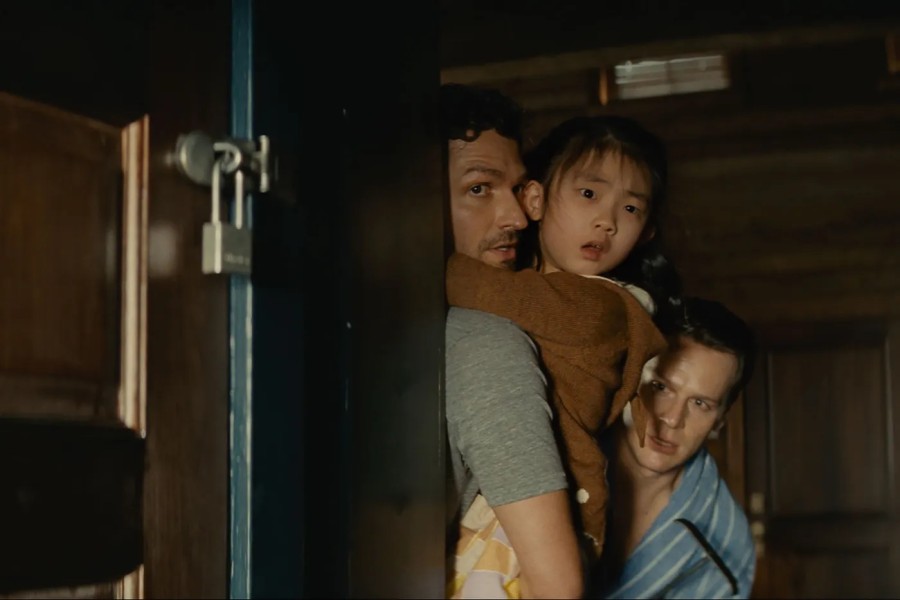Review: ‘Knock at the Cabin’ is an apocalyptic test of belief
M. Night Shyamalan’s latest continues a string of fascinating, mostly-solid thrillers.
Kristen Cui, Jonathan Groff and Ben Aldridge in “Knock at the Cabin” (2023). (Courtesy of Universal Pictures)
February 15, 2023
A new M. Night Shyamalan movie evokes many feelings these days. For years, he was the Spielberg-in-waiting, who built up his name and future with “The Sixth Sense,” a haunting movie that is mostly remembered for its infamous twist. Other films trickled out afterward, such as the masterful “Unbreakable” and the decent “Signs.” But it wasn’t until a series of commercial and artistic failures that Shyamalan became known as who he is today. When people think of Shyamalan, they think of wasted potential. But Shyamalan is one of Hollywood’s most misconstrued filmmakers, a restless craftsman whose goofy tendencies occasionally get in the way of greatness.
All of this is brought into sharp focus with his latest film, “Knock at the Cabin.” Adapted from the acclaimed 2018 horror novel “The Cabin at the End of the World”, “Knock at the Cabin” is centered around a simple question: If you could prevent the apocalypse by killing one of your family members, would you?
That central question is posed by none other than Leonard (Dave Bautista), who arrives at the rented vacation home of couple Eric (Jonathan Groff) and Andrew (Ben Aldridge), and their adopted daughter Wen (Kristen Cui). Fresh off a series of strong thrillers, starting with 2016’s “Split,” “Knock at the Cabin” provides Shyamalan with an opportunity to prove his strengths. His emphasis on clean, purposeful visuals, along with his repeated exploration of pet themes — the influence of faith and what it means to be an outcast — allows “Knock at the Cabin” to continue Shyamalan’s recent winning streak.
We’re first brought into the film’s world by its stillness. We first meet Wen outside, catching grasshoppers near the house, when Leonard approaches her. When he says that he’s there to make friends with Wen and her dads, it’s both unnerving and peaceful. There isn’t harm on the horizon — just awkward tension.
Directly after, in one of the film’s creepiest moments, we see Leonard’s companions emerge from the sylvan surroundings. Played by Rupert Grint, Nikki Amuka-Bird and Abby Quinn, Leonard’s assistants slink toward the camera with gnarled, ramshackle weapons. Wrapped in the lush greenery of the woods, and the sharp images of cinematographers Jarin Blaschke and Lowell A. Meyer, the shot of the intruders and their weapons might be the film’s most menacing.
Leonard and his companions break into the cabin and tie the family up, with Eric sustaining a concussion while attempting to fight off the intruders. The rest of the film takes place within the cabin, where Eric, Andrew and Wen are caught between trying to escape or waiting out the unnerving situation.
The film’s script takes us through several twists and turns. But it is Shyamalan’s steady visuals and direction, along with the cast’s strong performances — particularly from Aldridge and Bautista — that buoy the film. This is Bautista’s finest role yet. He is a friendly giant type who doesn’t approach Eric, Andrew and Wen with malice. Instead, he emphatically tries to explain that this isn’t a homophobic attack, and that he is genuinely anguished about what’s about to take place. Saddled with tiny glasses and a hushed voice, Bautista shines, bringing his aching heart to these gruesome events.
What prevents “Knock at the Cabin” from achieving greatness is its script, which fails to elaborate on the fascinating themes it introduces. Leonard and his companions are brought together by the shared belief that they must save the world, but their fanaticism isn’t explored; instead, it is simply accepted. When Andrew protests that the family’s captors are experiencing a collective delusion rather than besieged by divine knowledge, the film moves on without exploring that very real possibility.
The script is at its strongest when it looks closely at the idea of marginalization. Shyamalan has always been interested in characters who are dismissed by the world because of their differences, so his protagonists being a gay couple is a natural extension. Eric and Andrew’s dynamic as a duo is fully realized and allows for a sense of tenderness at the film’s core.
But the film’s core concept only opens more questions: Why these invaders? Why these hostages? Why this apocalypse? In the end, the surface-level exploration of these questions proves frustrating.
The invaders are presented through imagery that often correlates with that of religious fanatics and conspiracists, but aside from the appropriation of these visuals, the deeper meaning behind the association is never fully explored. Shyamalan doesn’t allow for “Knock at the Cabin” to delve too deeply into the nastiness of his subject.
The movie is never outright cruel. Shyamalan’s signature sappiness seeps through excessively, and although there is a tonal balance at play here that makes the film enjoyable, the dread the story seeks to evoke is squashed by an excess of humanity.
Contact Ethan Beck at [email protected].


























































































































































